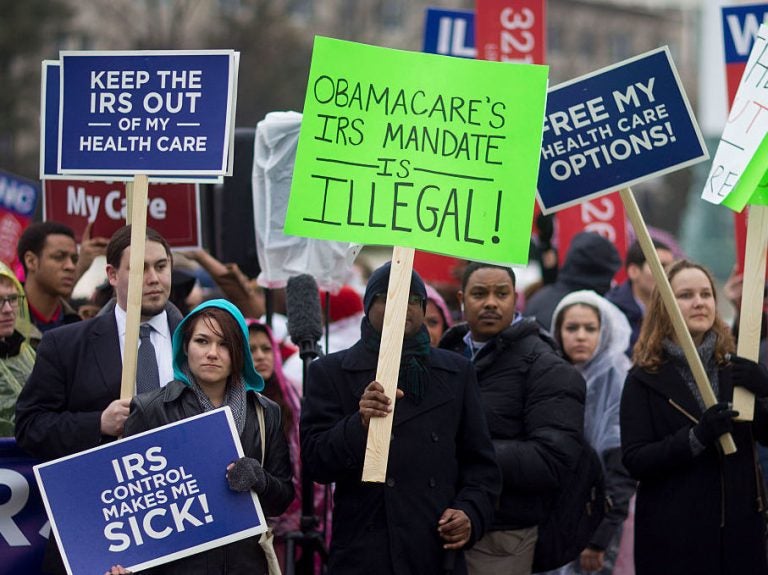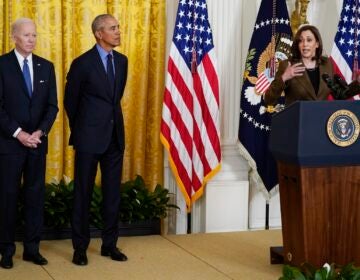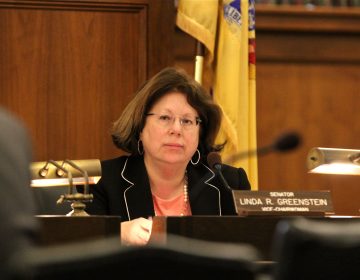Why do so many people hate Obamacare so much?

Opposition to Obamacare has been strong from the beginning. Demonstrators made their dissatisfaction clear in front of the Supreme Court in 2015. (Andrew Harrer/Bloomberg via Getty Images)
The Affordable Care Act, aka Obamacare, has roiled America since the day it was signed into law in 2010. From the start, the public was almost evenly divided between those who supported it and those who opposed it.
They still are. The November monthly tracking poll from the Kaiser Family Foundation found that 50 percent of those polled had a favorable view of the health law, while 46 percent viewed it unfavorably.
Partisan politics drives the split. Eighty percent of Democrats were supportive in November, while 81 percent of Republicans were strongly negative. (Kaiser Health News is an editorially independent program of the foundation.)
That helps explain why Republicans are working to repeal a key element of the health law in the tax bill Congress is negotiating. The requirement that most Americans have health insurance or pay a tax penalty — the so-called individual mandate — is by far the most unpopular provision of the law, particularly among Republicans.
Still, while partisanship is a major reason why some people hate the health law, it’s far from the only one. Here are four more:
Ideology
Conservatives and libertarians strongly object to the federal government becoming ever more involved in the nation’s health care system. While the refrain that the ACA represented a “government takeover” of health care was a significant exaggeration, the law did insinuate the government significantly further in its funding and oversight of health care.
Adding to that was the unhappiness with the ACA’s individual mandate. Although the idea was originally suggested by Republicans in the late 1980s, the GOP had mostly backed away from it over the years (with the notable exception of Massachusetts Gov. Mitt Romney, who supported that state’s health overhaul in 2006).
But conservatives aren’t alone in opposing the ACA on ideological grounds. Many liberals don’t like the law, either. They think it does not go far enough toward a fully government-run system and gives too much power to private insurance companies.
Lack of knowledge
A big part of why people don’t like the health law is that they don’t understand what it does or how it works. Some of that is because health care is complicated.
Even some of the main arguments made by the law’s supporters are not well understood. For example, the health law is responsible for some 20 million Americans gaining health insurance. Yet in 2016, when the uninsured rate hit an all-time low, only one-quarter of respondents to the Kaiser tracking poll knew that. A little under half thought the rate had remained unchanged, and 21 percent thought the rate had risen to an all-time high.
But some misperceptions follow intentional fabrications or exaggerations of the law’s impact. Many people came to believe (incorrectly) that the law would create “death panels” to decide the fate of seniors on Medicare, which became PolitiFact’s “Lie of the Year” in 2009. Other outlandish and untrue claims about the law included the idea that it would require people to be microchipped, that it would create a “private army” for President Barack Obama and that it would require hospitals to fire obese employees.
Even the derisive nickname Obamacare fed the confusion. In a now-famous skit by comedian Jimmy Kimmel, people on the street expressed a strong preference for the Affordable Care Act over Obamacare — unaware that they were the same thing.
Confusing the health law with the rest of the health system
Once the ACA became law, basically everything bad that happened in health care was attributed to it. This is the famous “you broke it, you bought it” problem. The law became the scapegoat for any number of shortcomings in the health care system, regardless of whether they predated its enactment.
For example, rising prices for prescription drugs have been a problem for years. But the ACA didn’t seek to address that, except for one provision that sought to facilitate generic copies of some of the most expensive biologic medications.
Also, before the ACA, some insurers stopped offering plans in the individual market, while others raised premiums dramatically and often wouldn’t cover care at high-cost providers like teaching hospitals.
Some people are worse off
The ACA did create some losers. Healthy people who managed to buy individual health insurance before the law’s passage have seen their premiums and out-of-pocket costs soar as insurers have raised prices to accommodate sicker people who had been largely shut out of coverage. Among those hardest hit are people who earn just slightly too much to qualify for federal premium subsidies, particularly early retirees and people in their 50s and early 60s who are self-employed.
Many of those people would have been helped if Democrats had been able to pass some of their original ideas for the ACA, including a “public option” plan run by the government, or a so-called Medicare buy-in that would have given people age 55 and older the option of purchasing Medicare coverage before the normal eligibility age of 65. Both were rejected by more conservative Democrats in the Senate.
Some people found themselves in a coverage gap after the Supreme Court in 2012 ruled that the ACA requirement for states to expand Medicaid had to be optional. That meant people with incomes under the poverty line but still too high to qualify for Medicaid in their states have no affordable program available.
Others were forced to give up coverage that they liked, even if it did not offer many benefits, or were angry because their doctors and hospitals were no longer in their insurers’ networks. Obama’s promise that “if you like your health plan you can keep it” was PolitiFact’s “Lie of the Year” for 2013.
However, even some of those consumers have seen benefits from the law, although they might not realize it, like required rebates from insurers who charge too much for administrative costs.
But it is human nature for people who feel wronged to complain loudly, while people who are satisfied merely go on with their lives. In the end, that is why it seems so many more people hate Obamacare than actually do.
Kaiser Health News, a nonprofit health newsroom, is an editorially independent part of the Kaiser Family Foundation. You can follow Julie Rovner on Twitter: @jrovner
9(MDAzMzI1ODY3MDEyMzkzOTE3NjIxNDg3MQ001))




